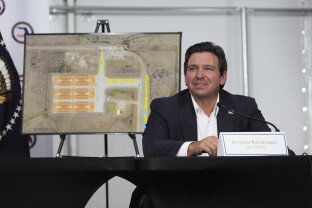After a failed presidential campaign and a bruising ego check, Gov. Ron DeSantis has finally found a way to mirror President Donald Trump.
The Florida governor’s push to build a new kind of detention center — dubbed “Alligator Alcatraz” — in Big Cypress National Preserve is stretching the bounds of executive power, in some ways achieving at the state level the kind of autonomy that has emboldened the second Trump administration.
DeSantis is using an emergency power normally reserved for disaster relief to sequester land for a massive detention facility from Miami-Dade County. Kevin Guthrie, the executive director of the Florida Division of Emergency Management, cited the state’s gubernatorial emergency powers statute when he wrote to Mayor Daniella Levine Cava saying that ongoing negotiations over the remote spot would be interrupted by a seizure.
“Time is of the essence. We must act swiftly to ensure readiness and continuity in our statewide operations to assist the federal government with immigration enforcement,” he wrote, offering a small consolation. “The division’s utilization of the property will last no longer than the duration of the state of emergency.”
The emergency is now rolling into its third year, renewed 16 times, with no end in sight.
The ramifications are sweeping, even beyond the scope of the detentions themselves. People who have long lived in the area say their lives and traditions are being upended. A slew of businesses, including some led by donors to the governor, are getting hefty contracts with limited oversight. And DeSantis is rehabbing his MAGA image, becoming not only a useful ally for Trump, but one who is showing how executive power can keep expanding into the future.
Local officials are now moving into mitigation mode, with the Miami-Dade mayor requesting remote video monitoring, weekly reports on facility conditions and occasional “scheduled” site visits.
“Given our land ownership of the site, we believe our request for monitoring access is warranted,” her office wrote to Homeland Security Secretary Kristi Noem earlier this month.
So far, Levine Cava has not heeded the public’s calls to sue and test just how far DeSantis’ emergency powers can go. It’s a long-anticipated fight.
“We were ringing this alarm for a while,” state Rep. Anna Eskamani told NOTUS.
Eskamani pointed to her Democratic colleagues’ unsuccessful effort two years ago to limit DeSantis’ emergency spending to natural disasters only.
But back then, she said, at least some Republicans in the state Legislature were willing to stand up to the governor, given how his failed presidential campaign against Trump had split GOP loyalties. Now, the governor is back in Trump’s good graces and faces little-to-no resistance from legislators and a state Supreme Court he packed himself.
“The only check and balance we had last session was tension between Trump and DeSantis,” Eskamani said. “But on this issue, they’re on the same page.”
That means having Florida offer up the nation’s first state-run migrant detention camp.
Immigration laws remain in the exclusive jurisdiction of the federal government, a point the U.S. Supreme Court reiterated when it blocked Florida from enforcing a law that makes it a crime for an undocumented person to be in the state. And yet Florida is now fronting what the Department of Homeland Security has estimated to be a $450 million-a-year operation.
Noem, after visiting the site with Trump on July 1, announced that “Alligator Alcatraz will be funded largely by FEMA’s Shelter and Services Program.” But that funding arrangement further complicates any efforts at accountability, offering a fast-flowing spout of federal emergency money to the governor’s office as it leans into the emergency declaration to quickly strike business deals that appear to be no-bid contracts.
The cash flow has already been a boon for some contractors: At least $225 million in state money has already been committed.
Several contracts have gone to DeSantis’ political donors, The Miami Herald documented this month. That includes at least $35.8 million to companies run by Carlos Duart and his wife, Tina Vidal-Duart, whom the governor previously appointed to lead the boards of Florida International University and Florida Atlantic University.
The state is also keeping the contract details opaque, with some being pulled from public view.
And some contracts aren’t clearly marked as related to the project, such as the $50,000 that was designated on June 30 for the law firm Boies Schiller Flexner and listed only as “services for FDEM,” which stands for the Florida Department of Emergency Management. That contract was raised to $150,000 on Monday without any publicly available indication that there was an update. Jesse Panuccio, a partner there who spent years defending the first Trump administration’s policies as the third highest-ranking official at the Justice Department, is now representing the state as it fights off a lawsuit attempting to halt construction on environmental grounds. That too is listed as “emergency procurement per executive order.”
Subcontractors that aren’t even found in state records are racing to post job openings in the unincorporated and largely uninhabited community of Ochopee: B6 Security & Investigations is seeking certified corrections officers willing to take a full-time contract; Patriot Response Group is hiring a construction site flagger; and GardaWorld says it needs a custodial facility operations program manager who would live on-site and support “a critical state contract at a migrant processing custodial facility. This is a long-term, contract-based position. Must be able to start ASAP!”
Florida’s auditor general — who is tasked with independently reviewing state expenditures for the Legislature — has yet to review any government contracts related to the “border crisis” emergency, the Orlando Sentinel revealed this month. James Dwyer, a retired certified public accountant who served as the state’s interim auditor general in 1999, warned that rushed contracts under emergency powers are “where you run into problems.”
“I think you’d be hard-pressed to find a situation where an emergency is declared and renews for years. That’s just not the nature of an emergency,” he told NOTUS.
“The danger is that, when it’s an emergency situation, you don’t reach all the right companies that might be capable. You don’t want to get into a situation where you just select somebody you know because you think they can do it. That’s where you get into concerns about favoritism,” he said.
The governor’s office did not respond to emails asking about the nature of the contracts. NOTUS has also filed public records requests to obtain copies of the state contracts.
Betty Osceola, a Miccosukee woman who was raised on her parents’ corn and pumpkin subsistence farming in the area, said DeSantis’ executive actions are harming her way of life. His use of power, she said, circumvents the legal protections that would normally slow down a massive project like this — and force state and federal officials to consider the impact this facility could have on her Native American tribe.
Osceola said she was worried that hired guards would block the access road she normally takes to reach the medicinal herbs she picks in the swamp — or that they’ll monitor the Miccosukee ceremonies they hold on Corn Dance Hammock just west of the new detention camp.
“They have cameras everywhere and surveillance. So if you’re out there practicing your spiritual ceremonies, do you want a drone and helicopter spying on you?” she told NOTUS.
Osceola shared several photos and videos with NOTUS that show how detainees have been transported to the site by DHS transit buses, unmarked white school buses and a coach bus that NOTUS traced to a company owned by an Alaska Native corporation called Akima Infrastructure Protection — a go-to ICE deportation contractor that already operates in Miami.
A steady stream of trucks — some of which mask their USDOT numbers and other identifying markings — are now clogging up the only road that leads to the detention facility. Tamiami Trail, a desolate stretch of highway that cuts through the Everglades, was built 100 years ago this summer by chain gangs of prisoners subjected to the Florida heat, alligators and venomous cottonmouth snakes — the same natural elements Trump now exalts when he brags about the dangers that surround the jail’s tents.
Alex Toal, an Army veteran and fishing and hunting guide who has regularly joined protests against the center, said the project stands to hurt not only Florida’s ecosystem, but its tourist economy.
“This is a precious ecosystem. People pay a bunch of money to come down to Florida and graciously spend their money,” he told NOTUS. “I don’t want to be fishing around a prison camp. I don’t want to park up the street from it.”
That sentiment is the driving force behind the strongest legal challenge yet: a lawsuit from two conservation groups who say DeSantis’ rushed project is in violation of the National Environmental Policy Act — a federal law that came into existence because of this very plot of land.
NEPA, signed by Richard Nixon in 1970, requires federal agencies to evaluate the impacts of proposed projects. The law sprang out of a fight over development in Big Cypress Swamp in the 1960s, which a scientist at the U.S. Geological Survey ultimately said would “inexorably destroy the South Florida ecosystem and the Everglades National Park.”
Friends of the Everglades and the Center for Biological Diversity, two local nonprofits, pointed to that law when they sued to block the rapid construction of the detention camp. They note the danger of having cleaning chemicals, diesel-powered generators and human waste from thousands of detainees and guards spill into the land.
Miami-Dade County attorneys have countered that “under Florida law, courts have little discretion to second-guess state emergency decisions,” adding that “there are no facial limits on the governor’s exercise of this power other than the general requirement that the use be reasonably necessary to cope with the emergency.”
Panuccio, the former DOJ official now representing the governor’s office, wrote to the federal judge that halting the camp’s construction would only worsen the “emergency,” given that “detention facilities are over capacity.”
DHS has taken the stance that federal environmental rules don’t even apply because “Florida is constructing and operating the facility using state funds on state lands under state emergency authority.”
Elise Bennett, senior attorney at the Center for Biological Diversity, said she’s still getting over her initial reaction that “there’s no freaking way this is real.”
“It’s a fake emergency. These powers were intended to react to hurricane response, the very thing we’re worried about on this site,” she said.
Sign in
Log into your free account with your email. Don’t have one?
Check your email for a one-time code.
We sent a 4-digit code to . Enter the pin to confirm your account.
New code will be available in 1:00
Let’s try this again.
We encountered an error with the passcode sent to . Please reenter your email.



